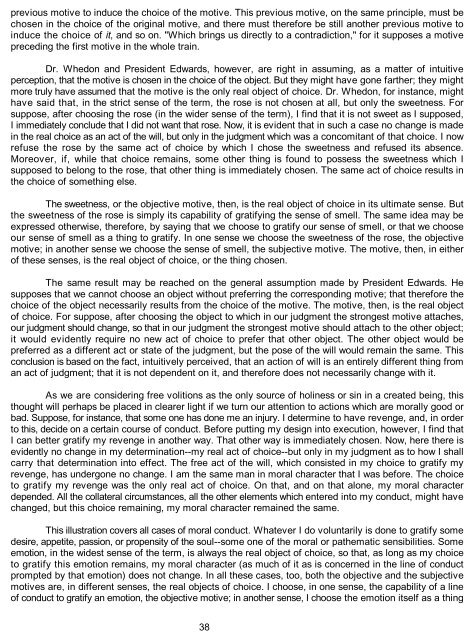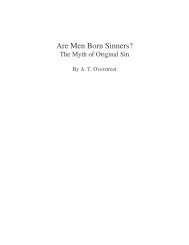Foreknowledge by Joel Hayes - Library of Theology
Foreknowledge by Joel Hayes - Library of Theology
Foreknowledge by Joel Hayes - Library of Theology
Create successful ePaper yourself
Turn your PDF publications into a flip-book with our unique Google optimized e-Paper software.
previous motive to induce the choice <strong>of</strong> the motive. This previous motive, on the same principle, must be<br />
chosen in the choice <strong>of</strong> the original motive, and there must therefore be still another previous motive to<br />
induce the choice <strong>of</strong> it, and so on. "Which brings us directly to a contradiction," for it supposes a motive<br />
preceding the first motive in the whole train.<br />
Dr. Whedon and President Edwards, however, are right in assuming, as a matter <strong>of</strong> intuitive<br />
perception, that the motive is chosen in the choice <strong>of</strong> the object. But they might have gone farther; they might<br />
more truly have assumed that the motive is the only real object <strong>of</strong> choice. Dr. Whedon, for instance, might<br />
have said that, in the strict sense <strong>of</strong> the term, the rose is not chosen at all, but only the sweetness. For<br />
suppose, after choosing the rose (in the wider sense <strong>of</strong> the term), I find that it is not sweet as I supposed,<br />
I immediately conclude that I did not want that rose. Now, it is evident that in such a case no change is made<br />
in the real choice as an act <strong>of</strong> the will, but only in the judgment which was a concomitant <strong>of</strong> that choice. I now<br />
refuse the rose <strong>by</strong> the same act <strong>of</strong> choice <strong>by</strong> which I chose the sweetness and refused its absence.<br />
Moreover, if, while that choice remains, some other thing is found to possess the sweetness which I<br />
supposed to belong to the rose, that other thing is immediately chosen. The same act <strong>of</strong> choice results in<br />
the choice <strong>of</strong> something else.<br />
The sweetness, or the objective motive, then, is the real object <strong>of</strong> choice in its ultimate sense. But<br />
the sweetness <strong>of</strong> the rose is simply its capability <strong>of</strong> gratifying the sense <strong>of</strong> smell. The same idea may be<br />
expressed otherwise, therefore, <strong>by</strong> saying that we choose to gratify our sense <strong>of</strong> smell, or that we choose<br />
our sense <strong>of</strong> smell as a thing to gratify. In one sense we choose the sweetness <strong>of</strong> the rose, the objective<br />
motive; in another sense we choose the sense <strong>of</strong> smell, the subjective motive. The motive, then, in either<br />
<strong>of</strong> these senses, is the real object <strong>of</strong> choice, or the thing chosen.<br />
The same result may be reached on the general assumption made <strong>by</strong> President Edwards. He<br />
supposes that we cannot choose an object without preferring the corresponding motive; that therefore the<br />
choice <strong>of</strong> the object necessarily results from the choice <strong>of</strong> the motive. The motive, then, is the real object<br />
<strong>of</strong> choice. For suppose, after choosing the object to which in our judgment the strongest motive attaches,<br />
our judgment should change, so that in our judgment the strongest motive should attach to the other object;<br />
it would evidently require no new act <strong>of</strong> choice to prefer that other object. The other object would be<br />
preferred as a different act or state <strong>of</strong> the judgment, but the pose <strong>of</strong> the will would remain the same. This<br />
conclusion is based on the fact, intuitively perceived, that an action <strong>of</strong> will is an entirely different thing from<br />
an act <strong>of</strong> judgment; that it is not dependent on it, and therefore does not necessarily change with it.<br />
As we are considering free volitions as the only source <strong>of</strong> holiness or sin in a created being, this<br />
thought will perhaps be placed in clearer light if we turn our attention to actions which are morally good or<br />
bad. Suppose, for instance, that some one has done me an injury. I determine to have revenge, and, in order<br />
to this, decide on a certain course <strong>of</strong> conduct. Before putting my design into execution, however, I find that<br />
I can better gratify my revenge in another way. That other way is immediately chosen. Now, here there is<br />
evidently no change in my determination--my real act <strong>of</strong> choice--but only in my judgment as to how I shall<br />
carry that determination into effect. The free act <strong>of</strong> the will, which consisted in my choice to gratify my<br />
revenge, has undergone no change. I am the same man in moral character that I was before. The choice<br />
to gratify my revenge was the only real act <strong>of</strong> choice. On that, and on that alone, my moral character<br />
depended. All the collateral circumstances, all the other elements which entered into my conduct, might have<br />
changed, but this choice remaining, my moral character remained the same.<br />
This illustration covers all cases <strong>of</strong> moral conduct. Whatever I do voluntarily is done to gratify some<br />
desire, appetite, passion, or propensity <strong>of</strong> the soul--some one <strong>of</strong> the moral or pathematic sensibilities. Some<br />
emotion, in the widest sense <strong>of</strong> the term, is always the real object <strong>of</strong> choice, so that, as long as my choice<br />
to gratify this emotion remains, my moral character (as much <strong>of</strong> it as is concerned in the line <strong>of</strong> conduct<br />
prompted <strong>by</strong> that emotion) does not change. In all these cases, too, both the objective and the subjective<br />
motives are, in different senses, the real objects <strong>of</strong> choice. I choose, in one sense, the capability <strong>of</strong> a line<br />
<strong>of</strong> conduct to gratify an emotion, the objective motive; in another sense, I choose the emotion itself as a thing<br />
38






